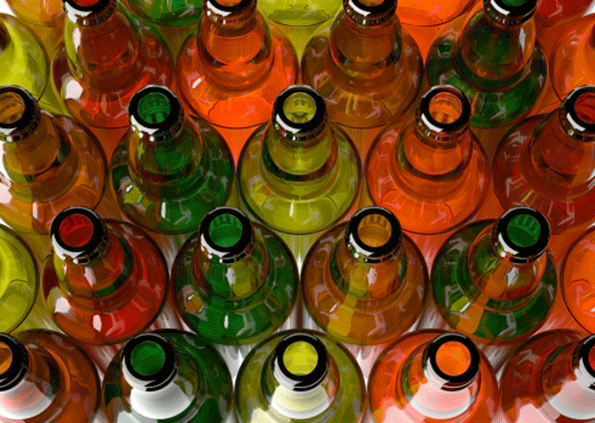2019 Brings New Changes for Municipal Glass Recycling
Municipal waste services across the U.S. are considering whether to eliminate or revamp curbside collection of glass for recycling.
The start of 2019 has brought important changes to municipal waste services across the country as they determine whether to eliminate or revamp curbside collection of glass for recycling.
In Mt. Lebanon, Pa., a suburb of Pittsburgh, the decision has been made to phase out the glass collection service. “The solid waste and recycling is collected contractually in our community, and the contractors that submitted bids for the new contract indicated that they would no longer accept glass in the recycling stream,” says Rudy Sukal, Public Works director.
In an explanation to residents, a notice posted on the Mt. Lebanon municipal website explains that Mt. Lebanon, along with 18 other South Hills Council of Governments municipalities, bid jointly for waste hauling, including recycling services, and the resulting contract led them to revise their services.
The municipality noted a couple of reasons for its policy change: the market for recycled glass has decreased and broken glass can contaminate the load. “Shattered glass embeds into other recyclable materials (such as cardboard or paper), making those other items unable to be recycled,” according to the Mt. Lebanon notice.
Glass diversion is still a concern for Mt. Lebanon. “We are working on alternatives to divert glass from the solid waste stream and provide our residents with a process for recycling it, but do not have that option in place at this time,” says Sukal.
Arlington County, Va., in the Washington, D.C., suburbs, is considering ending curbside glass recycling this year. No official decision has been reached on whether to end collection, but changes could be rolled out over the next couple of months, according to Shani Krulijac, solid waste operations manager with Arlington County.
For now, glass is included in the list of single stream recycled materials that are collected from single-family curbside customers. Multifamily residences and commercial businesses are expected to recycle glass as part of their single stream recycling, as well, says Krulijac, but the county may soon switch to a drop-off system rather than continue to collect the material.
“Currently, there is really no market for glass materials, at least not in this region,” says Krulijac, who notes that hauling the heavy material a long distance to a facility is not the most environmentally preferable practice, especially if there is not a viable market for the material.
Arlington has a contractor that collects the material and hauls it to a local transfer station, and from there, material goes to a Waste Management sorting facility. From that point, if there is no place to take the sorted glass, it will be hauled back to the waste-to-energy facility in Alexandria, Va., says Krulijac.
Just as in Mt. Lebanon, the goal is not to abandon glass recycling, but rather to find an alternative way to make it successful. Arlington is talking with other jurisdictions and experimenting with two drop-off locations for glass, located in the northern and southern parts of the county. So far, the stream has been pretty clean, says Krulijac, after staff spent time going through and removing contaminants to help users get the picture.
Next, the idea is to haul the material to nearby Fairfax County, which has small-scale glass processing machinery. “They are looking for clean glass material,” says Krulijac.

In Little Rock, Ark., curbside glass collection is being phased out. “Our recycling contract with Waste Management expires in April, and because of market shortages in our area, they weren’t interested in continuing with glass collection,” says Warren Atkins, division manager, solid waste division, who says the city decided to end curbside glass collection as a result.
“There are three municipalities involved in this contract and all finally agreed to drop glass. The county that surrounds these cities also has a separate contract with Waste Management, but they’ve never collected glass in the county,” says Atkins.
Faith Mullins, recycling and sustainability educator for the city of Little Rock, explains to residents asking about changes to the recycling program that broken glass wreaks havoc on the entire recycling process. Not only do the broken pieces of glass stick to paper and cardboard, but they are also tough on sorting machinery at the materials recovery facility (MRF).
“The broken pieces of glass act as sandpaper on the moving pieces of the sorting machinery, specifically the belts. This significantly increases monthly and yearly maintenance costs of the very expensive equipment at the MRF,” says Mullins.
Little Rock is now looking for other ways to recycle glass in the community, including working with Little Rock-based window and door company ACE Glass. “In partnership with ACE Glass, we are going to provide glass drop-off locations across the city,” says Mullins, who notes that ACE Glass also offers a weekly glass pick-up program for $10 a month.
This year certainly will not bring the end of municipal glass recycling, but rather a rethinking of the process. These challenges aren’t unique to particular regions or communities in the country, but without a resolution to these issues, more municipalities will continue to debate how to make curbside collection and recycling both more cost efficient and more environmentally friendly.
About the Author
You May Also Like


